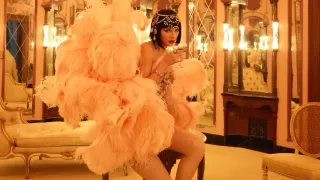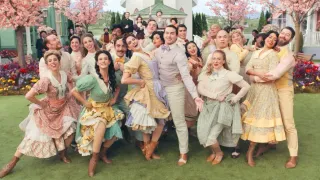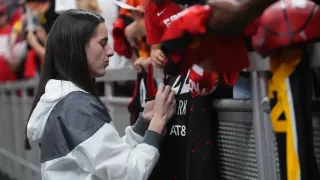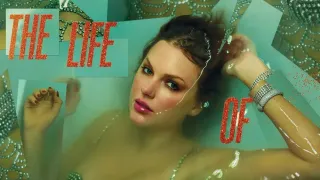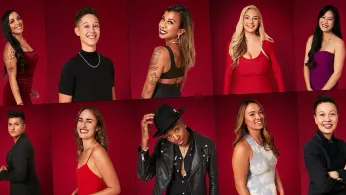
3 hours ago
Netflix Cancels 'The Ultimatum: Queer Love' After Two Seasons
READ TIME: 4 MIN.
Netflix has officially canceled "The Ultimatum: Queer Love," the queer spinoff of its popular reality dating series, after just two seasons, delivering what many in the LGBTQ+ community are calling a significant blow to queer representation in reality television . The cancellation was announced on October 2, 2025, while the original heterosexual version of "The Ultimatum" will continue to air .
The show, which premiered in 2023, featured queer couples testing their relationships by dating other people before deciding whether to get engaged or break up. Despite generating substantial conversation within LGBTQ+ communities and providing what fans described as "endless conversational fodder for endless lesbian group chats," the series struggled with casting challenges and viewership metrics .
"The Ultimatum: Queer Love" ran for two seasons, airing in the summers of 2023 and 2025, and became known for its dramatic relationship dynamics and memorable cast members. The series featured participants like Mal Wright, who was praised for "modeling mature communication techniques," and created viral moments that resonated within queer online communities .
The show's format encouraged couples to explore relationships with other participants before making final decisions about their partnerships, leading to what fans and critics alike described as "chaotic" but entertaining television . Despite its polarizing nature, many viewers appreciated having LGBTQ+ representation in the reality dating genre.
One particularly memorable aspect of the series was its host, Joanna Garcia Swisher, who was recognized by fans as "being such a good ally" to the queer community throughout the show's run . The series also generated its own podcast and created numerous quotable moments that became part of LGBTQ+ internet culture.
The cancellation of "The Ultimatum: Queer Love" reflects a troubling trend in LGBTQ+ television programming. According to industry observations, queer-inclusive reality dating shows have historically struggled to last beyond two seasons, with this cancellation fitting a pattern of limited longevity for LGBTQ+ content .
The timing of this cancellation is particularly concerning given the current political and entertainment industry climate. The number of television shows featuring LGBTQ+ women and transgender characters reached its peak in 2022 and has been declining since then . This downward trend coincides with what many describe as an increasingly hostile political environment for LGBTQ+ rights and representation.
Industry analysts note that streaming services are currently slashing budgets across the board, making it particularly challenging for niche programming, including LGBTQ+ content, to secure renewals . This economic pressure, combined with the ongoing political climate, has created what many describe as the most difficult environment for queer television programming in recent years.
One of the significant factors contributing to the show's cancellation was the difficulty in casting participants. Unlike heterosexual dating shows, which can draw from a larger pool of potential contestants, "The Ultimatum: Queer Love" faced unique challenges in finding suitable couples willing to participate in the show's format .
The show required couples who were already in committed relationships but questioning their future together, a specific demographic that proved challenging to recruit within the LGBTQ+ community. Additionally, the format's requirement for participants to be open to dating others while being filmed added another layer of complexity to the casting process.
The cancellation has sparked significant discussion within LGBTQ+ communities about the importance of representation in reality television, even when that representation may not always present the community in what some consider the most positive light. Many fans argued that while the show might have been considered "bad" by some standards, it provided entertainment value and representation that the community deserved .
Social media responses to the cancellation revealed the show's cultural impact, with many viewers expressing disappointment at losing what they described as a guilty pleasure that allowed them to engage with queer relationship dynamics on screen. The show had become a shared cultural touchstone for many LGBTQ+ viewers, particularly lesbian and bisexual women.
The cancellation raises questions about the future of LGBTQ+ reality programming on major streaming platforms. While some queer dating shows like "I Kissed a Girl" have secured second season renewals, the overall landscape remains challenging .
Industry advocates have called for streaming services to recognize the value of LGBTQ+ programming beyond traditional viewership metrics, arguing that these shows serve important cultural functions for underrepresented communities. The cancellation has also renewed calls for more diverse hosting and production teams across reality television programming.
As the entertainment industry continues to navigate budget constraints and changing viewer preferences, the fate of "The Ultimatum: Queer Love" serves as a reminder of the ongoing challenges facing LGBTQ+ representation in mainstream media. While the original "Ultimatum" series continues, many community members are calling for Netflix and other networks to ensure that queer voices and stories remain part of the reality television landscape.
The show's cancellation comes at a time when LGBTQ+ communities are facing increased political pressure and social challenges, making the loss of visible representation in popular culture particularly significant. As streaming services continue to make programming decisions based on various metrics, advocates emphasize the importance of considering the cultural and social value of diverse programming beyond traditional success measures.
The legacy of "The Ultimatum: Queer Love" will likely be remembered not just for its dramatic moments and relationship chaos, but as a representation of the ongoing struggle for sustained LGBTQ+ visibility in mainstream entertainment. As one fan noted, the show was "a supernova: it shined bright, and burned out too quickly," leaving many to wonder when similar opportunities for queer representation in reality television might emerge again .
